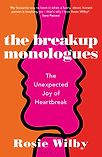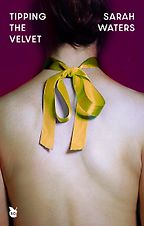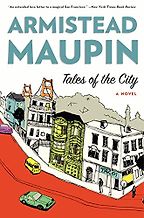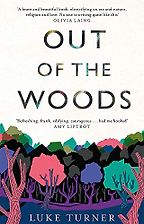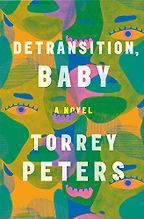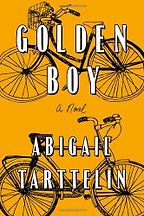Thank you for selecting these five landmark LGBTQI books. Let me quickly spell out here, for our readers, that LGBTQI stands for ‘lesbian, gay, bisexual, transgender, queer and intersex.’ To start us off, could you talk a little bit about the importance of the representation of LGBTQI voices in literature?
I think there’s a theme that we are going to touch on a lot during this conversation: the conflict that we all have as creatives who are minority voices—how much we want to be a ‘lesbian writer’ or ‘lesbian comedian’, say. Because obviously you want to appeal to a broad market too, to sell enough books to make a living. But it’s complex for me, because I’ve generally been something of an activist and primarily known within the LGBTQI community.
I’ve had lots and lots of gigs at LGBTQI festivals over the years—and lesbian nights, women’s festivals, and fringe-y alternative events where the queer community and our allies primarily make up the attendees. I’ve had reviewers come to some of my comedy shows and say, ‘Why is it only lesbians here? Everyone should know about this show.’
So it’s an interesting question for me. Because I do want to reach broader audiences, and my new book and podcast, The Breakup Monologues, is part of an attempt to look at a very universal topic. Because I think the way we have relationships, largely speaking, is the same for all of us: we fall in love, we break up, we get our hearts broken. So many processes are the same.
But, then again, I’ve found myself particularly fascinated by the nuances of queer relationships. I’m a woman who has largely always had relationships with other women, and there are very specific things about relationships between women that I think are interesting. Other gay women who come to my shows and read my work really appreciate me pointing those out; now that I’m reaching slightly broader audiences, I think heterosexual women are also finding it interesting to read about those nuances.
Sometimes women say to me, ‘I wish I was a lesbian, it’d be so much easier.’ They think men are so annoying, so relationships with other women would be a breeze—but sometimes it’s just as complicated. When sexual attraction comes into the equation, everything is always complicated. Human beings are flawed, whatever our gender.
So I do think there are specific things about queer relationships I want to address, particularly the fact that lesbians have a much higher divorce rate than anyone else.
Really?
Yes. This is really fascinating to me. Lesbians cycle through serial monogamy at a much higher rate than any other group. They pioneered ‘conscious uncoupling’ long before Gwyneth Paltrow. So I’m interested in how the LGBT community sits slightly outside the family structures of marriage and having children, and how we’ve sometimes come up with creative solutions and ways of looking at family and commitment in other ways. Ideas such as ‘living apart together’ originated in the queer community.
So for me as a queer creative, there’s this conflict between wanting to write things that are broad and wanting to represent my community and my experience really authentically.
“Lesbians cycle through serial monogamy… they have a much higher divorce rate than anyone else”
Of course we want to reach wider audiences, and it’s interesting to look at how perhaps, in a couple of years, I might be talking about having smashed out of that sort of gay ghetto—you know, being on the gay bookshelf and appearing at gay book festivals. That’d be a great thing. But I do think that those events are really super important in themselves. The audience at them is so different to a general mainstream event.
As a comedian, promoters have said to me, ‘aren’t all comedy nights gay friendly?’ And I have to say, well, no. Because unfortunately we still live in a world where there is homophobic humour. Sometimes that’s just an old school male compere who is slightly unaware, someone who is not up to date on where we are with pronouns and language because this is a time of real transition and change. Not everything has caught up. So I do think we need supportive, community spaces—places like Gay’s the Word, the London bookshop. Lots of my friends and fans go out of their way to buy my book from them. But, then again, it’s important to get a good rank on Amazon too!
Your selection of LGBTQI book recommendations is really well considered, thank you. You’ve chosen one ‘landmark’ book for the lesbian community, one for the gay community, for the bisexual community, the trans community and the intersex community. Shall we talk about Sarah Water’s Tipping the Velvet first?
Yes. With Sarah Waters and Armistead Maupin, I want to talk broadly about their work and cultural resonance, so it made sense to choose their first books—because they had that initial impact.
Sure. Tales of the City predates me, but I do remember when Tipping the Velvet came out, and the subsequent television adaptation. It was a phenomenon, and her writing more generally continues to be so. She writes lesbian history into our conception of Victorian history. Could you tell us more?
Yes. I really admire Sarah. Lesbian characters are right at the forefront in her books. And what’s interesting is that she has always done that. I was lucky enough to interview her for a queer radio show I used to host for many years on Resonance FM. I always loved writers who took time out of their hectic schedules to talk to a more community-focused LGBT show, because you knew they cared about the community as well. We had a really interesting conversation, because she talked about how it has never been a problem for her to put lesbians in the forefront, perhaps because she did it so unashamedly in Tipping the Velvet and set out her stall early on.
She said she almost had more of a problem with The Little Stranger, the one that didn’t have lesbians in it, when she had… not exactly a negative response, but some concern from lesbian followers who were worried she was not representing them anymore. They had been holding so tightly to her as this person who was representing them, writing about them. So, almost a reverse of what other authors have told me.
For example, when I spoke to Stella Duffy, she said that it was when she wrote a book with a male protagonist, that’s when she started getting nominated for prizes and taken more seriously. So Sarah had almost the exact inverse experience. But I think she’s really inspiring, and that it’s interesting, the cultural resonance this book had. Once you have a TV adaptation, and then a French and Saunders spoof, you know you have really, really made it.
Five Books interviews are expensive to produce. If you're enjoying this interview, please support us by donating a small amount.
There was even a live stage play adaptation, where the sex scenes were interpreted as aerial acrobatics. It was quite something—women whizzing above the stage. I remember an ex-girlfriend and I reading sections of Tipping the Velvet to one another on holiday. It was the kind of book that every gay woman was reading for a while. Everyone was starting to think about lesbian history, and Sarah does so much detailed, methodical research about the history of relationships between women, and how same-sex desire was framed before it was really understood as this social construct.
When I spoke to her, she was promoting her book The Paying Guests; one of the characters talks about not having ‘the man microbe’. I thought it was interesting that there was an understanding of difference, even if the language wasn’t the same: an alternative sexual template. So yes, I love her writing. I love the funny little character traits and domestic details. She talked about going through old newspapers to find funny crimes and that kind of thing.
I find her an interesting role model. And when you meet her, she’s a quiet, unassuming, lovely, sweet person who is not, you know, full of ego at all her success.
She, and Alan Hollinghurst—whose work I know you considered including on the list—are known for their explicit sex scenes. Do you think that’s significant?
Yes. Why not? Because there are plenty of heterosexual authors and filmmakers who have fairly explicit sex scenes. It’s interesting how still, within our culture, when any sexuality deviates from the norm we still think it’s more explicit, even if it’s an equivalent physical act. There are more warnings on things if there is sexual action between women, or between men. That said, I have seen quite out-there gay male films. But why not be out there? Why be ashamed of it?
For most people—unless we are asexual—sex is a big part of our lives, a big part of what drives us, a big part of what makes us do interesting things, take actions, feel strong emotions. And those are often the things that are interesting to write about and tell stories about. Perhaps if you don’t understand the intensity of the sexual attraction between these protagonists, maybe we don’t understand what they are doing outside of sex.
Yes. Let’s talk about Armistead Maupin’s Tales of the City.Why is this a landmark LGBTQI book?
Oh, I love Armistead Maupin! Tales of the City is just so touching and fun. And truly landmark. Although I’m choosing it to represent the G in LGBT—the gay male author of the genre—he also represents everybody, particularly the trans community. I mean, Anna Madrigal was this revolutionary trans landlady, a very motherly character who looks after everybody. You know, sellotapes joints to their doors.
The first Tales of the City came out in 1978. I was lucky enough to interview Armistead in 2014, when the final, ninth Tales of the City was coming out, The Days of Anna Madrigal. I think most people know that ‘Anna Madrigal’ is an anagram of ‘a man and a girl’; it just seemed such a revolutionary thing, that there was this wonderful trans character, who he told me was partly inspired by his grandmother, who was a bit of a new age hippy, and once was a suffragist in the UK.
As with Sarah Waters, his work has had real cultural resonance. We’ve seen it on screen—a TV adaptation that I saw back in the 1990s, when I was first coming out. And more recently there’s been another adaptation on Netflix. We should all celebrate that.
“When any sexuality deviates from the norm we still think it’s more explicit, even if it’s an equivalent physical act”
His books say so much about community. He talks about the idea of ‘logical’ family, as opposed to biological family. When he first arrived in San Francisco in 1971, and was absorbing the atmosphere that eventually permeated his books, he discovered a sense of community in alternative family. So many people at that time were rejected by their biological parents, because it was still seen as a mental illness to be homosexual. So gay people clung to one another and formed these little microcosms of community, alternative family, which the queer community has long held as a kind of template for life, and for survival.
He also talks about coming out. His character Michael Tolliver, or ‘Mouse’, writes a very famous letter called ‘Dear Mama’, which has been turned into musicals, performances and theatre shows. Scissor Sisters have done a version of it. It’s become something outside of the books, that ‘Dear Mama’ letter. People have used it as a template for coming out to their own parents.
You know, around that time, Harvey Milk was making speeches saying, ‘you must come out.’ There was this message that it would help others if we stood up: we would have strength in numbers. So the idea of coming out was very, very important. And it’s taken a long time for the majority of queer young people to feel safe coming out. We’re getting there.
But, for example, I had a relationship from 2006 to 2011, the relationship that inspired all my work on breakups—because I got dumped by email at the end of it, which I felt was very cold and impersonal—but what was so very complex and painful about that relationship was that she was not out to her family.
Oh no.
It was very, very obstructive to being able to move forward in a relationship with somebody. We didn’t live together. We were both women in our thirties who I think would have been interested in exploring having a child, but that just felt so completely off the list of things we could possibly do, because our parents didn’t even know we had a partnership. I met her mum once, for about twenty minutes, in five years. I never met her father at all. It was very, very difficult to feel like this. This was in the noughties, only just over a decade ago, but it was still this very shameful secret. We’ve come a bit further since then. But it’s amazing how not that long ago it was still something people did not want to know, and would close their ears to. So I think having people like Armistead walk in who were writing on the challenges of coming out, and reflecting that emotional experience of sitting down and writing that letter… that has been really important.
Do you think members of the LGBT community still feel a pressure, or responsibility, to publicly come out?
Perhaps there’s not the same sense of political responsibility. Although there are some old school activists like me who would say it’s still really important. But of course the labels are becoming broader and more fluid; our ideas about gender are becoming less binary. That’s a great thing. But it becomes more complicated, and changes how we think about being ‘other’, being queer. Because there are some people who are ostensibly straight, but are sort of hetero-flexible. On the one hand, it’s all very healthy, we’re a bit more fluid. But perhaps it then becomes more grey, more complex when we’re campaigning for equality legally. Sometimes, as frustrating as it can be, you need labels to actually get the boxes ticked, you know? Being able to get married, have children, do things that a more traditional family or couple could do.
It’s interesting times, and I think it’s still important to stand up and say who you are. But I think there’s a generation of younger people now who would shy away from labels, wanting things to be more broad and fluid. We’re getting to a point where that can be the way, but I’m not sure we’re there yet. I think we do still need to be able to say ‘I’m queer,’ ‘I’m gay,’ or whatever labels you prefer to use: standing up and being counted.
Well, the next of your LGBTQI books brings us right into the present. This is Luke Turner’s memoir Out of the Woods, which intertwines his experiences as a bisexual man with reflections on Epping Forest, just outside of London. Jessica J Lee picked him for a ‘fresh voices in nature writing’ reading list. I’d love to hear your take on the book.
Yes, it’s interesting that the three books I’ve chosen for the B, the T, and the I on this list are more recent titles, because I think we have been less aware of the bi community, the trans community and in particular the intersex community until very recently.
What’s interesting about bisexuality is that, I think, we have become comfortable with the concept of bisexual women—particularly among a certain sort of arty, bohemian set—but I don’t think we hear enough about bisexual men. I don’t think we really hear about them at all, to be really honest.
There are loads of sexual studies where participants are shown sets of ‘erotic’ images, and your genital arousal, pupil dilation and reported states of arousal are all measured. Even the findings of these experiments, largely, seem to say that bisexual men don’t exist. Meanwhile, you find that women tend to be aroused across the board by anything, whatever the genders and orientations of the people they are watching.
There’s been a spike in popularity of male-male romance novels among heterosexual female readers recently. For example, Casey McQuiston’s Red, White and Royal Blue, which has been a huge seller.
Even if women might not publicly declare the arousal, their physiology says otherwise. I find that very interesting—that female sexuality is more broad, more vast than we, as a society and culture, like to admit.
The findings of these studies often say that the men were either turned on by men, or turned on by women. So there is this weird idea that there aren’t bisexual men.
And yet I know men who would disagree.
Luke’s book was really important for meeting that need for a role model or some kind of representation. I guess he’s a tiny bit younger than me: he talks about how in the 1990s, sex education in schools was woeful for heterosexuals, let alone gays and lesbians, and especially those in the middle.
How he comes across those different sexualities is very extreme and very different. He’s primarily having settled and domestic relationships with women, but the male sexuality he stumbles across is in gay male cruising grounds in Epping Forest when he is exploring, as you say, his natural environment among the trees. This very in-your-face male sexuality, which is definitely part of the gay male scene. And you know what? Good for them, if everything is consensual and safe. But of course there’s a whole other side to gay male sexuality and relationships. I know some very, very committed gay men who have been married to a civil partner for decades.
But it’s interesting that Luke’s experience of that queer sexuality is possibly quite scary—anonymous sex is available if you want it, but gosh, is that what he’s looking for? He very poetically weaves in this conflict about his bisexuality, and wanting to own both parts of that identity, with this story about his relationship with nature. There is something sexy about nature and the outdoors, something organic, real and earthy.
Recently—relatively recently—I went to see a dance performance which was all about the domestic relationship between two men, and it struck me that I probably see more depictions of hypersexualised gay culture than of non-sexual, same-sex intimacy. But that might just be what I’ve happened to have seen and read.
You could be right. I think that’s part of the complexity of being gay: your sexual orientation shapes the course of your life, shapes what friendships you’re going to make, shapes what bothers you. It shapes what parties you go to, what bookshops you go to… So much of your identity is shaped by sex.
I don’t think it’s the same for straight people. The friendships you make are just people you hung out with at school and ended up having common interests with. For so long, I wrote about sex, I spoke a lot about sex, because I thought my life had been so defined by it. I thought it would be difficult to have a relationship with a woman that I had lost that sexual passion with, because surely that would be a compromise, almost like being with a man. Which of course it’s not… because now I’ve got an amazing partner. We are engaged to be married! But there is a complexity around gay sexuality because our culture and identity has been so shaped by sex that it’s almost hard to escape it, and the feeling that sex must be vital to the health of our relationships.
I think that has partly fuelled the serial monogamy you see in lesbian relationships—because they can settle quite quickly into something that feels like a kind of domestic friendship. Gay men too. But it’s sort of a stereotype that lesbians suffer from what’s known as ‘lesbian bed death’, a phrase coined by an American sexologist called Dr Pepper Schwartz. This was back in the 1970s; she found lesbian couples reported themselves to be having the least sex in longer term monogamous partnerships.
Next, you’ve selected Torrey Peters’ Detransition, Baby as the next of your LGBTQI landmark books, to represent trans literature.
It follows a trans woman called Reese who is a Brooklyn 30-something. It’s a sort of trans Fleabag, I think, because she’s in a series of inappropriate relationships with men who are just awful and unavailable to commit to her. But she really craves that settled domesticity, that quote-unquote ‘normal’ family life that is starting to become available to queer people.
I’ve heard Torrey talk about the evolution of ‘queer possibility’, which is similar to what I was talking about earlier, for myself and my generation of lesbians—how we feel we’ve just missed out on motherhood. There’s probably a similar generation of trans women, slightly behind us, who feel that it’s not quite acceptable yet for trans women to become mothers. People can’t talk about it comfortably yet.
So it’s very interesting to read a book where you have a trans woman who really, really craves this. Her detransitioned ex, Ames, comes to her with an unusual proposition. Ames now identifies as male, having formerly identified as female but having decided that living as a trans women is too difficult and challenging. Which I think is an interesting point in itself. The anti-trans lobby would perhaps use the fact that some trans women detransition as evidence that they weren’t ever really women. Whereas, actually, the point I think Torrey is making is that it’s just so difficult to live as the gender you feel you really are, because there’s so much violence and prejudice and horrible stuff directed at you.
“Trans awareness and acceptance is two or three decades behind the acceptance of gay people”
So Ames is no longer Amy, but has gone back to being Ames, which is a modification of his birth name, James. And he has got his new partner, Katrina, pregnant—which is really fascinating, because you would have thought that after the hormone treatment it would not be possible. Torrey says she’s heard stories of it happening: former trans women going back to living as a man, and getting partners pregnant. Often they’re very surprised by this outcome. And how do you navigate around that?
For Ames, in particular, the thought of being part of a heteronormative family unit with Katrina is a step too far. So bringing Reese into the equation seems to make sense to Ames, making it different to this normative narrative which isn’t something he’s comfortable with. Katrina is a woman of colour, who has had miscarriages before. So they’ve all been through transformations of some kind.
There are so many interesting details and conversations—they talk about the politics of queerness and identity, the kind of discussions you can’t quite imagine on social media, because they have the freedom to talk without the backlash.
Yes. It’s truly a novel of ideas. They debate what it means to be a family, what it means to be trans, or to have a relationship. And I think it’s very illuminating for that reason—partly because, as you say, it’s a sort of safe space, they can say things out loud, follow the logic to the end point. I can understand why it’s been received with such interest.
Yeah. I also like the alternating timelines. I’ve heard people speaking about this—for transitioned and detransitioned characters, that time travelling—
Flashbacks and flash-forwards, just in case readers think we are suggesting science fictional elements.
—is a way of moving them between their different gender identities without having to go through, in real time, the lengthy and painful and complex process of transition. Which you can read about elsewhere… like in Juliet Jacques‘ fantastic Trans: A Memoir. I thought that was a really interesting editorial aspect, how it allows for hopping between the different identities, particularly of the detransitioned character Ames.
Yes. Detransition, Baby became a focus of controversy here in Britain after it was longlisted for the high profile Women’s Prize. More generally, the UK has been the scene of an unpleasant moral panic about trans women in recent years.
We can touch on that, in as much as I would echo what I said a minute ago about trans parenthood—it feels like a lot of people aren’t comfortable with that yet. And the trans community still has to be pushing for recognition today. Trans awareness and acceptance is two or three decades behind the acceptance of gay people.
It’s A Sin was on television recently, and it took me right back to what the culture was like in this country in the 1980s, when I was a teenager. If you look at the statistics, prejudice was at an all time high. It was absolutely the wost decade to start realising you might be gay. Gay people were hated. They were thought to be diseased. It was a terrible time. And, sadly, I think we’re in a sort of equivalent time of prejudice against trans people now.
That brings us to the last of your landmark LGBTQI books, Abigail Tartellin’s Golden Boy, which you’ve selected to represent the intersex community.
I read this book when it first came out in 2013. I had not been clued up enough about the intersex community at the time. I’ve subsequently gotten to know Abigail a bit and have asked her for writing advice, because I love the way she structures her fiction.
Get the weekly Five Books newsletter
I found it really interesting how this tells the story of an intersex teenager who hides this secret. The book unfolds a bit like a thriller. You’re really tense about Max’s secret and whether people are going to discover it, and what’s going to happen to him. He presents as a boy, goes to school as a boy, but very early on—in quite a shocking chapter written in Max’s own voice—he is sexually assaulted by a slightly older boy, a family friend, who is one of the few people that knows Max’s secret. It’s such a startling way of demonstrating how vulnerable somebody who is different in some very intimate and personal way can feel. Max also worries that he can get pregnant, because he doesn’t know the biology. It all unfolds in a very compelling way. You just want to care for Max and give them a hug and help them through this.
Abigail’s book has been published around the world in 70 different languages, and she gets so many wonderful messages from intersex people and the families of intersex people saying how important her book has been. Abigail has spoken about wanting to put Max in a very average family, on a very average street, rather than depicting intersex people on the margins.
We spoke about visibility earlier. Do you think there’s still work to do on raising awareness and understanding of intersex issues?
Oh gosh, definitely. You know, it’s not all that long ago, historically, that babies born intersex would have corrective surgery at birth—if you obviously had both genitalia, then a decision would be made before the baby had grown up how they would present in the world. Which is very shocking.
Yes. The Jeffrey Eugenides book Middlesex features an intersex protagonist who runs away from home to avoid a similar surgery in adolescence.
It’s incredibly shocking that we still have this idea that if someone doesn’t have, you know, the expected set of genitalia that something has to be done, they have to be ‘fixed’. What’s difficult for us to grasp about intersex is that there are so many different ways it can present—hormonally, biologically, physiologically. We need to be a lot more aware than we are.
Abigail’s book did a great job of setting this story in the everyday street, family, school, and making us realise that there are probably intersex people around us, and we just haven’t realised.
As a closing question: why do you think it’s important that we read outside our own demographics? Why should—say—a straight, cis- reader make time to read narratives from the LGBTQI community?
We’ve all just been given a wake up call about racial representation with Black Lives Matter. We’ve realised how much white culture we have always consumed and how much we are enriched by opening our eyes to TV shows like I May Destroy You. This is a very similar issue.
As a gay woman, I’ve watched so many straight stories and tried to transpose myself into that narrative. When I was a teenager, I used to love this TV show called Moonlighting, and I remember thinking… am I supposed to be the Bruce Willis character or the Cybill Shepherd character? As queer people, we have tried to transpose ourselves into heteronormative stories for so long. So we would absolutely love for our straight friends and allies to read our stories, understand them, and hear our voices. That would mean so much and would be so important.
Interview by Cal Flyn, Deputy Editor
July 12, 2021
Five Books aims to keep its book recommendations and interviews up to date. If you are the interviewee and would like to update your choice of books (or even just what you say about them) please email us at [email protected]

